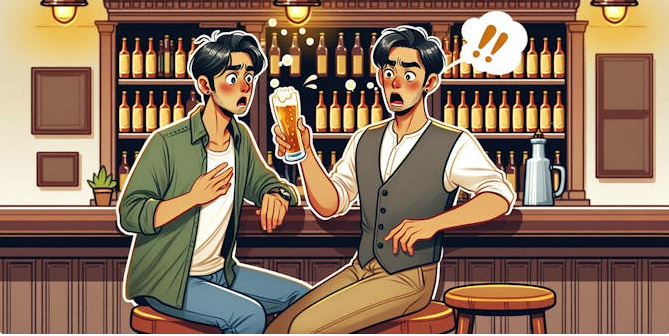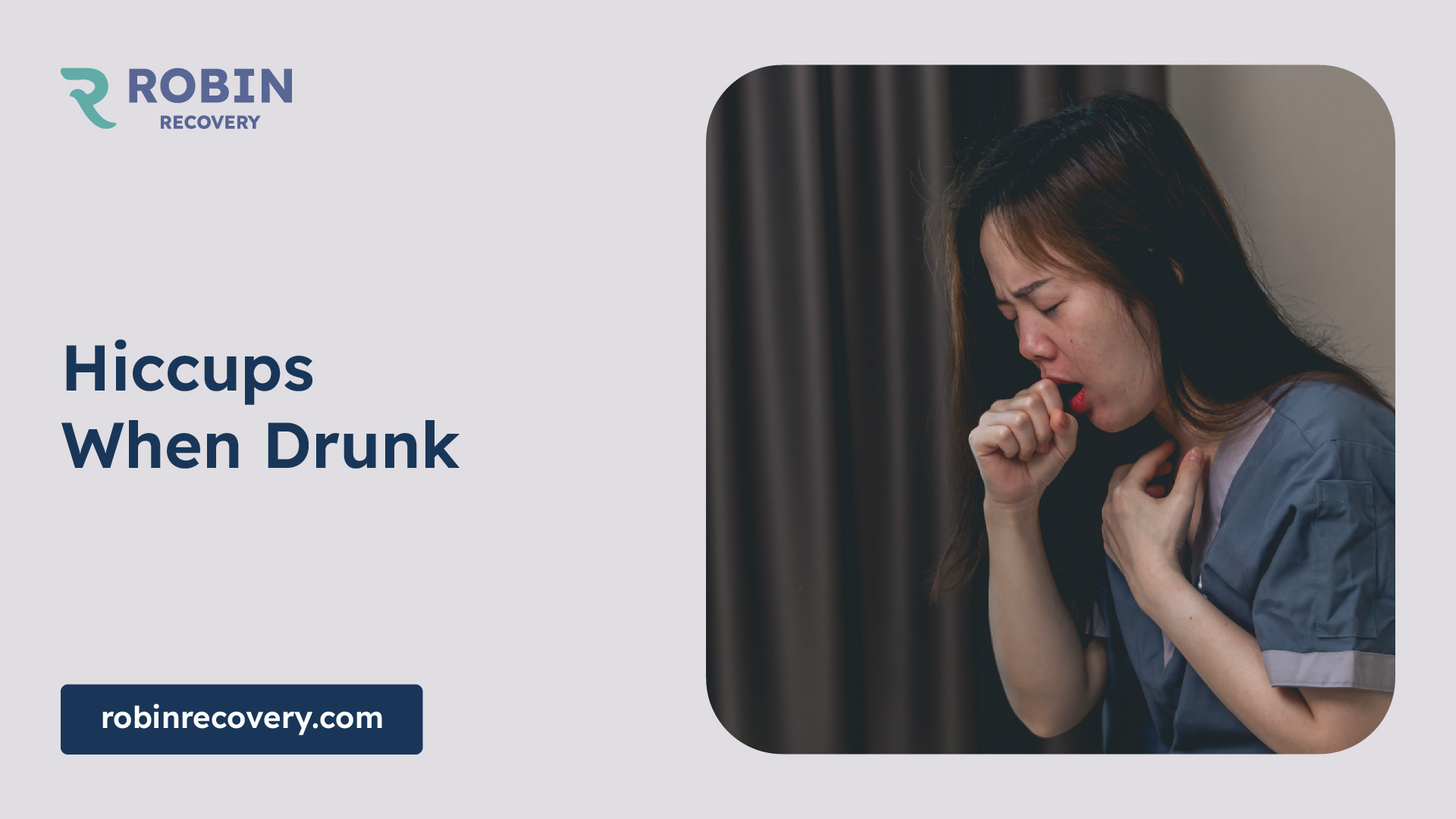Hiccups When Drunk

Understanding Hiccups
Before delving into the specific scenario of hiccups when drunk, it's essential to understand what hiccups are and what generally triggers them.
Mechanism of Hiccups
Hiccups are typically caused by a strong contraction of the diaphragm, a muscle located just under the lungs and separates the abdomen from the chest. This sudden contraction results in a quick closing of the vocal cords, which produces the characteristic sound of a hiccup. However, experts are not entirely sure what causes these contractions.

To understand why hiccups occur when drunk, it's important to know how alcohol affects the diaphragm and related nerves. Alcohol can lead to hiccups by irritating these areas, causing the diaphragm to contract in an abnormal manner. This can result in a bout of hiccups, particularly if you are consuming alcoholic beverages quickly or in large quantities.
Factors Triggering Hiccups
While there are many potential triggers for hiccups, alcohol is a well-known one. This is primarily due to its effect on the stomach and digestive system. Consuming alcohol can cause the stomach to become distended, which can in turn trigger hiccups. Furthermore, alcohol can increase acid production, leading to acid reflux. This irritation of the esophagus can also contribute to the onset of hiccups.
In addition to alcohol, other factors can also trigger hiccups. These can include consuming large meals, drinking carbonated beverages, or experiencing sudden changes in temperature. Stress and excitement can also induce hiccups in some individuals.
While there is no guaranteed way to avoid hiccups, certain measures can be taken to reduce their likelihood. When it comes to alcohol consumption, choosing non-carbonated drinks, drinking slowly, and limiting alcohol intake may be helpful in preventing alcohol-induced hiccups.
Alcohol and Hiccups
Consuming alcohol, especially in excess, often leads to the occurrence of hiccups. Let's dive deeper into understanding this connection and the effects of alcohol consumption on the body.
Alcohol as a Hiccup Trigger
Alcohol is a known hiccup trigger due to its ability to distend the stomach, irritate the digestive system, and increase acid production, ultimately leading to hiccups. Hiccups are caused by a strong contraction of the diaphragm, a muscle located just under the lungs that separates the abdomen from the chest. Anything that causes the stomach to become distended can trigger hiccups, and alcohol can irritate the diaphragm, contributing to hiccups.
Alcohol-induced hiccups can also originate from talking and eating too fast, which causes the swallowing of air and distension of the stomach. A distended stomach can press on or irritate the diaphragm, triggering hiccups. Common alcoholic beverages like beer and carbonated drinks can contribute to this effect.
In most cases, hiccups triggered by alcohol will stop on their own within a few minutes. However, minding the amount and type of alcohol when imbibing can help keep hiccups away.
Effects of Alcohol on the Body
While hiccups triggered by alcohol are usually not dangerous, hiccups lasting longer than 48 hours or frequent episodes could be a sign of underlying health issues like gastroesophageal reflux, nerve damage, or a tumor [1].
Severe and long-lasting hiccups could affect your ability to eat and sleep, leading to exhaustion, malnutrition, and dehydration. Although this is very rare, it's important to be aware of these potential complications and seek medical help if hiccups persist.
Additionally, alcohol is a known hiccup trigger because it irritates the digestive system, including the esophagus, which can trigger hiccups and increase acid production, leading to acid reflux. This can cause discomfort and other digestive issues if left untreated.
Understanding the relationship between alcohol and hiccups can help individuals manage and prevent hiccups when drunk, ensuring a more comfortable and enjoyable drinking experience. As always, it's important to consume alcohol responsibly and seek medical help if hiccups persist or cause discomfort.
Risks and Complications
For the most part, experiencing hiccups when drunk is temporary, harmless, and more of an annoyance than a health concern. However, there are certain risks and complications associated with prolonged hiccups that one should be aware of.
Prolonged Hiccups Warning Signs
Hiccups triggered by alcohol are typically not dangerous, but if they persist longer than 48 hours or if you have frequent episodes, it could be a sign of underlying health issues. Conditions such as gastroesophageal reflux (GERD), nerve damage, or a tumor may be at play [1].
Most hiccups related to alcohol consumption are acute, meaning they are short-lived and usually last a few minutes to a few hours. Hiccups that last more than 48 hours, however, are classified as persistent or protracted, indicating a need for medical evaluation [2].
Impact of Persistent Hiccups
While rare, persistent hiccups can lead to a serious medical condition known as singultus. Severe and long-lasting hiccups can affect your ability to eat and sleep, leading to exhaustion, malnutrition, and dehydration [1].
If hiccups persist for more than 48 hours, it is advised to seek medical attention [2].
In summary, while hiccups when drunk are usually a temporary inconvenience, keep an eye out for prolonged episodes. These may be a sign of an underlying health issue that needs medical attention. Be aware of the impacts of prolonged hiccups and seek help if necessary.
Managing Alcohol-Induced Hiccups
While hiccups can often be a harmless, albeit annoying, side effect of drinking alcohol, they can also serve as a sign that the body is struggling to process alcohol. Fortunately, there are several remedies and preventative measures that can help manage hiccups when drunk.
Remedies for Hiccups
Most hiccups stop on their own within a few minutes, but individuals who wish to expedite the process can try various methods. These include holding their breath, sipping cold water, or gargling with water, as per Healthline.
Breathing techniques can also be effective in controlling hiccups. Holding your breath or breathing into a paper bag can help regulate the diaphragm and potentially stop hiccups.
Drinking water or non-alcoholic beverages can stimulate the vagus nerve, which plays a role in controlling hiccups, and interrupt the hiccup reflex. It's best to avoid carbonated or fizzy drinks, as they can potentially aggravate hiccups.
Prevention Tips for Hiccups
While preventing hiccups entirely may not be possible, especially when consuming alcohol, there are steps that can be taken to reduce their frequency and severity:
- Moderate Alcohol Consumption: Limiting the amount of alcohol consumed can help reduce the likelihood of hiccups.
- Avoid Mixing Drinks: Mixing different types of alcohol can irritate the digestive system and trigger hiccups.
- Eat Before Drinking: Consuming food before alcohol can slow the absorption of alcohol, potentially reducing the chance of hiccups.
- Stay Hydrated: Drinking water or other non-alcoholic beverages in between alcoholic drinks can help maintain hydration and potentially prevent hiccups.
- Don't Rush: Drinking alcohol slowly and in moderation can help prevent the rapid changes in stomach temperature that can trigger hiccups.
If hiccups persist for more than 48 hours or if they reoccur frequently, it is recommended to contact a doctor. Seeking medical attention is advised if someone experiences other symptoms alongside hiccups, such as chest pain or breathing difficulties.
Seeking Medical Help
Although hiccups are typically a temporary inconvenience, there are instances where they might indicate a more serious issue, especially if they persist for an extended period or recur frequently. Understanding when to seek medical help is key to addressing and managing the issue effectively.
When to Consult a Doctor
Most cases of hiccups are acute, meaning they usually last a few minutes to a few hours. However, if hiccups persist for more than 48 hours, it's recommended that one consult a doctor. Hiccups that last for an extended period are classified as persistent or protracted by medical professionals [2].
Moreover, frequent episodes of hiccups can sometimes signal an underlying health issue such as gastroesophageal reflux, nerve damage, or even a tumor. If someone experiences hiccups for more than 48 hours, they should seek medical attention as chronic hiccups could lead to insomnia, exhaustion, and weight loss if a person cannot eat [2].
It's also important to consider other symptoms that may accompany hiccups. For instance, if hiccups are accompanied by chest pain or breathing difficulties, one should seek immediate medical help.
Addressing Persistent Hiccups
Persistent hiccups can have a significant impact on an individual's quality of life. In severe cases, long-lasting hiccups can affect one's ability to eat and sleep, leading to exhaustion, malnutrition, and dehydration.
Addressing the issue of persistent hiccups involves identifying the underlying cause. Your healthcare provider may recommend diagnostic tests or refer you to a specialist depending on your symptoms. Treatment options vary and may include lifestyle changes, medication, or in some cases, surgery.
In conclusion, while hiccups are usually harmless and temporary, it's important to be aware of when they might indicate a more serious problem. Persistent hiccups or those accompanied by other worrying symptoms should not be ignored and warrant medical attention.
Additional Insights
In the context of hiccups when drunk, certain practices may help to alleviate this common, yet often annoying, phenomenon. This includes specific breathing techniques and maintaining adequate hydration.
Breathing Techniques for Hiccups
Breathing techniques can be effective in managing hiccups, as they help regulate the diaphragm and potentially stop hiccups. Examples of such techniques include holding your breath or breathing into a paper bag.
Another effective method, as suggested by Healthline, is to try holding your breath and swallowing simultaneously. This can create a slight pressure in the chest area, which can override the hiccup reflex.
Here are some breathing techniques to try:
- Holding your breath: Inhale deeply and hold your breath for as long as you can.
- Breathing into a paper bag: Take deep breaths into a small paper bag, and then exhale back into the bag.
- Gargling with water: While not a traditional breathing technique, it requires breath control and can be effective in stopping hiccups.
Hydration and Hiccups
Keeping the body well-hydrated can also play a role in managing hiccups. Drinking water or non-alcoholic beverages can help stimulate the vagus nerve, which plays a crucial role in controlling hiccups, and interrupt the hiccup reflex.
It's best to avoid carbonated or fizzy drinks, as these can potentially aggravate hiccups. Instead, opt for still water or non-caffeinated drinks. Sipping cold water can also sometimes interrupt the hiccup reflex and bring relief [2].
Remember, while these techniques can be helpful, hiccups are usually temporary and resolve independently. If the hiccups persist for an extended period, it may be necessary to consult a healthcare professional.
These additional insights into managing alcohol-induced hiccups can be beneficial for individuals seeking relief from this common, alcohol-related annoyance. By employing these techniques, one may be able to reduce the frequency and duration of hiccups when consuming alcohol.
References
[1]: https://www.healthline.com/health/alcohol/hiccups-when-drunk
[2]: https://www.medicalnewstoday.com/articles/hiccups-when-drunk
[3]: https://www.mainspringrecovery.com/blog/hiccups-when-drunk
[3]: https://www.ojp.gov/ncjrs/virtual-library/abstracts/taking-hiccups-out-alcohol-education
[3]: https://www.wellbrookrecovery.com/post/hiccups-when-drunk
